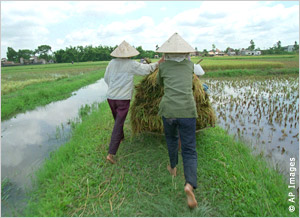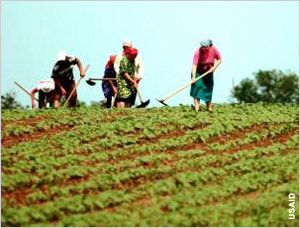World Food Day Unites People in Fight Against Hunger
World Food Day Unites People in Fight Against Hunger
19 September 2012

Members of a farming coop in Da Ton, Vietnam, haul harvested rice on a bicycle. Some farmers say they get emotional security from belonging to a cooperative.

Through Agrostoc, Moldovan farmers gained access to the quality and cost-effective supplies they needed to improve their operations.
Washington — Cooperative enterprises that produce and market food bring higher yields, better quality products and greater profits to many farmers than if they worked alone, says the U.N. Food and Agriculture Organization (FAO).
To acknowledge the role cooperatives play in the goal of global food security, the FAO has made the theme for World Food Day 2012 "Agricultural cooperatives — key to feeding the world." FAO in 1979 proclaimed October 16 as World Food Day to raise international awareness and understanding of approaches to ending hunger. Every year since 1981, World Food Day has been observed by people in more than 100 countries.
FAO defines a cooperative as an association of members who come together to form a jointly owned, democratically controlled enterprise that satisfies its members’ needs while pursing profit and sustainability.
Cooperatives are a positive economic model in emerging economies, according to international cooperative leader Land O'Lakes, based in Minneapolis.
Globally, more than 1 billion people are members of cooperatives. Around the world cooperatives provide more than 100 million jobs and generate $1.1 trillion in value. If the 300 largest cooperatives were a national economy, the economy would be the world’s 10th largest, according to FAO.
Smallholder farmers, or farmers with few resources, will provide much of the extra food needed to feed the more than 9 billion people who will live in the world by 2050. One means to achieve that is by investing in farm cooperatives, producer organizations and other rural institutions, FAO says.
Research shows that while smallholder farmers acting alone have not benefited when food prices rise, those acting collectively in strong producer organizations and cooperatives can better take advantage of market opportunities while being able to cope with the negative effects of food crises.
Cooperative member services include coordinated access to credit, natural resources, information, technology and training, and farm supplies such as seeds, fertilizers and farm machinery. By building smallholders’ skills, cooperatives help them innovate and adapt to changing markets. Cooperatives also offer members the emotional security that many find in being part of a member organization.
In 2001, 15 agribusiness operators, with support from the U.S. Agency for International Development, founded Agrostoc Input Supply Cooperative in Moldova. Its goal was to combine members’ purchasing power and give farm stores the ability to deal directly with producers and first-tier distributors.
As a result, store and customer costs went down, profits went up and the stores’ inventories expanded. And as a profitable business was established, farmers gained access to the quality and cost-effective supplies they needed to improve their operations.
The cooperative grew to more than 100 members, and sales increased from $500,000 in 2002 to $13.5 million in 2010.
Cooperatives also help members negotiate fair commercial conditions and look for allies with management or marketing experience. In Thailand, the company Swift Co. Ltd. contracted with farmers’ groups to grow predetermined types and quantities of fruit. The company removed middlemen by guaranteeing a fixed price for each type of fruit, to be renegotiated annually. It built collection stations in the middle of every growing area so the fruit could be collected fresh every day. Procedures for weighing and grading fruit became transparent.
“Cooperatives are a reminder to the international community that it is possible to pursue both economic viability and social responsibility,” said United Nations Secretary-General Ban Ki-moon.
The pamphlet Agricultural Cooperatives: Key to Feeding the World (PDF, 842KB) is on FAO’s website.